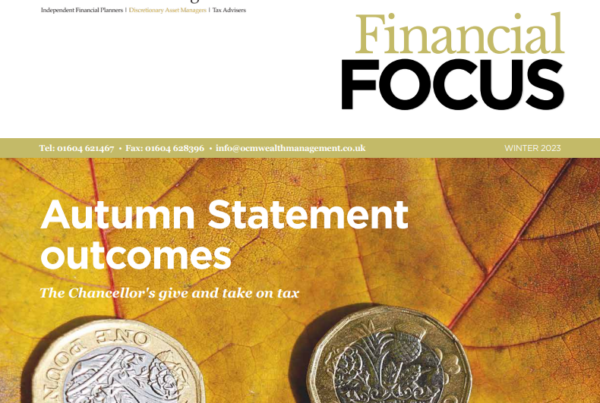Lower global growth, Brexit uncertainty and a flurry of earnings downgrades
Following the OECD’s growth downgrades detailed in last week’s commentary, evidence of further weakness in China and an escalation in geopolitical tensions this week have further reinforced the downside pressures weighing on the global economy, allowing risk-off sentiment to prevail over the week, despite increasing optimism over a US-China trade agreement ahead of talks next month.
Over the week, as Brexit-related uncertainty remained elevated on the ruling of the Supreme Court that the recent prorogation of Parliament by Boris Johnson’s government was illegal, data began to suggest that this prolonged uncertainty coupled with external factors is now beginning to feed through into corporates. In our September Investment Committee Meeting, the committee highlighted that perhaps the most significant risk facing the global economy and suggesting a near term decline in global equity markets is declining corporate profitability. The committee argued that increasing input cost pressures such as wages and tariffs alongside reducing demand due to external issues would squeeze margins and feed into lower return expectations. This view was reinforced over the week across the globe, as a flurry of earnings downgrades in companies such as FedEx, Pearson, International Consolidated Airlines Group and others were announced, while Thomas Cook’s demise was hastened by lower demand and Brexit uncertainty. It is clear that the tide is beginning to turn within the UK market as risks tilt towards the downside, with others likely to follow suit as further weakness in China and Europe emerged in the economic data for September and August.
For further information about the growth slowdown in China and Q3 expectations, please see the attached Market Update Document.
After the sell off in bond markets at the beginning of the month, as geopolitical tensions escalated over the week and data continued to deteriorate, bond markets regained lost ground as risk-off sentiment increased demand for bonds and safe haven assets. Looking at the portfolios, we are almost back to where we were at the beginning of the month, reinforcing the temporary nature of the sell off. We continue to monitor this exposure carefully, however remain confident in our allocation against a backdrop of declining growth, central bank easing and rising risks in equity markets.
Key events this week:
- Friday: US and UK Consumer Sentiment for September, Eurozone Business Confidence
- Monday: Chinese Manufacturing data for September, UK final Q2 GDP
For anyone who wants further data to substantiate the position please review the attached Global Economic News Document attached and the economic data set also attached.
Model Portfolios & Indices
Over the week, most global equity markets declined amid rising downside risks in the global economy. Markets remained highly volatile over the week as recessionary concerns remain, with investors struggling to find further support as geopolitical risks remained high and the data continues to disappoint.
Safe haven assets such as gold gained over the week alongside bonds, indicating that the risk-on sentiment observed earlier this month was temporary as expected, with bond yields beginning to decline again over the week. Equity markets gained over the week overall, however the intraday movements reflected a lack of direction as equity investors grapple with recessionary fears and uncertainty over trade policy. It is clear that geopolitical tensions remain, and the economic data continues to illustrate weakness in the global economy, with risks now firmly tilted towards the downside. The OBI portfolios remain defensively positioned with limited equity exposure and a downward tilt which seeks to benefit when equities decline, and our portfolios remain well positioned given current conditions. The portfolios gained over the week as the bond exposure performed strongly while the inverse equity exposure gained. It is expected that the bond exposure within the portfolio will continue to perform over the coming weeks, regaining lost ground following the sell off earlier in the month.
As we progress from here, it is important to recognise that we should not let benchmark performance make us feel like we have missed out on anything, because although we have in the short term, recent performance shows how quickly this can be reversed given current levels of risk and uncertainty.
Overall, it is our view that equity markets will continue to decline before adjusting to the new norm based on lower global growth and weaker corporate profitability. The key point here is to take a long-term view, look at the current level of uncertainty in the global economy, and remember that the portfolio is designed to minimise your exposure to risk and preserve capital. Markets are behaving irrationally, therefore the most sensible strategy is a defensive one given current market conditions.
Important Information
The data above will not directly correlate to the indices as there is always a delay in pricing because the US markets close significantly later than the European markets and the Asian markets. The data set above reflects the last close and much of the days movements will not yet be reflected in the portfolios due to pricing delays. You cannot therefore directly correlate indices to the portfolios. The value of investments may fluctuate in price or value and you may get back less than the amount originally invested.
Past performance is not a guarantee of future performance. Performance figures quoted include the fund manager charges but exclude other fees such as adviser, custodian, switch and/or discretionary investment management fees. Unless otherwise instructed and accrued, income is reinvested into the portfolio.
This Day in History
On this day in 1984, Britain agreed to transfer full sovereignty of Hong Kong to China in 1997, ending over 150 years of British rule. The Sino-British Joint Declaration was signed by Margaret Thatcher outlining the plan for Hong Kong and China to enter the ‘One Country, Two Systems’ model. Earlier this year, protests over a proposed bill that threatened the one country, two systems arrangement broke out. The bill has now been scrapped, however social unrest remains over the future relationship with China.
Have a great week,
Jason & Gina
Jason Stather-Lodge CFP, MCSI, APFS



